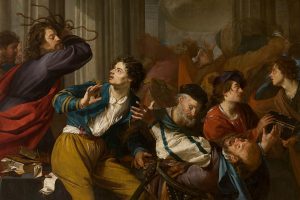Readings (Year B)
Isaiah 61:1–2A, 10–11
Luke 1:46–48, 49–50, 53–54.
1 Thessalonians 5:16–24
John 1:6–8, 19–28
Reflection: Rejoice in God-with-us
It was my fifth night in the ICU after being hospitalized for severe internal bleeding this fall. My night nurse, Antonio, engaged me in conversation as he inserted fresh IV ports in my arms that carried my medications and transfusions. He told me how he came to New York City from his native country, the Philippines, several years ago. He shared deeply moving stories of the trials of the spring and early summer when the hospital struggled with the massive influx of patients because of the COVID pandemic. He talked about the fear that gripped him and his fellow nurses as they worked to heal so many of a disease they hardly understood. He shared how he lived away from his family for weeks out of fear of bringing the disease home to his loved ones. He spoke of how some of his coworkers got severely sick and his secret terror that he could be next.
Months later, his stories stay with me. I’m deeply moved by how he was still present to the sick despite the hardships he endured. During this extraordinary time he tended to the most vulnerable and infirm as if it was the most ordinary thing to do.
The third Sunday of Advent is called “Gaudete Sunday,” from the Latin imperative verb for “rejoice.” This exhortation resounds in the reading from Isaiah: “I rejoice heartily in the Lord, in my God is the joy of my soul.” The reading from Saint Paul also tells us to “rejoice always” and to give thanks “in all circumstances.” The summons to rejoice now anticipates the fuller joy to come at Christmas.
But this call to rejoice seems incongruous given what many of us have endured this year. Disruption marks most of our school and work routines. Families and friends gather at a “social distance.” Shuttered businesses reveal the financial uncertainty that haunts many. We live with a constant hum of fear, anxious that an unexpected cough or sneeze might mean a serious illness. So many grieve the loss of loved ones whose lives have been cut short.
These days talk of rejoicing sounds unreal, naive, or even delusional.
But Isaiah’s message gives a more nuanced understanding of joy. Far from denying harsh realities and bitter experiences, the prophet speaks of rejoicing only after social divisions and wounds have been healed. It is only after the prophet puts on “a mantle of justice,” engages the needs of the marginalized, and heals broken souls that the community finds joy and rejoicing happens.
Joy comes not through a denial of brokenness and pain. Joy is possible because among us there are those moved by the Spirit of God to comfort and heal.
People like Antonio and his fellow nurses and health care providers.
People like the EMTs who gave me lifesaving care and ferried me to the hospital.
They show us that in the dark days in which we live, there are bearers of light and hope. Joy arises from realizing there are many among us who notice the brokenhearted and afflicted. And then go the proverbial extra mile to alleviate their distress. These are God’s agents of justice and hope. They are Emmanuel, God-with-us.
The poet, Theodore Roethke, writes: “In a dark time, the eye begins to see.” Perhaps this difficult time reveals the deeper meanings of our Advent prayer, “Come, Lord Jesus.” We would not plead for God to come into our lives if we weren’t in dire need and trusted that God would respond. That trust is the reason for our joy—a joy possible even in this difficult time of trial.
Receive our weekly liturgical reflections in your inbox! Click the button below to sign up.














Add comment